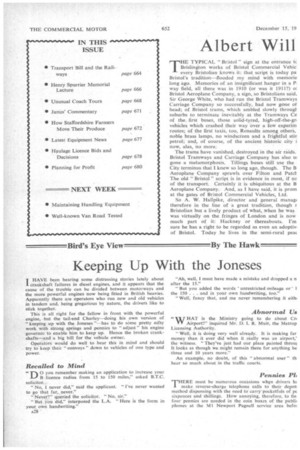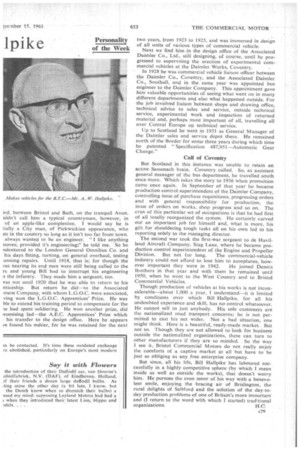Albert Will lpike
Page 30

Page 31

If you've noticed an error in this article please click here to report it so we can fix it.
Personality of the Week THE TYPICAL " Bristol " sign at the entrance tc Brislington works of Bristol Commercial Vehic. every Bristolian knows it: that script is today pa Bristol's tradition—flooded my mind with memorie long ago. Memories of an insignificant hangar in a P; way field, all there was in 1910 (or was it 1911?) ol Bristol Aeroplane Company, a sign, so Bristolians said, Sir George White, who had run the Bristol Tramways Carriage Company so successfully, had now gone of head; of Bristol trams, which ambled slowly throne suburbs to terminate inevitably at the Tramways Ce of the. first buses, those solid-tyred, high-off-the-gr. vehicles which crashed their way over a few experim routes; of the first taxis, too, Renaults among others, noble brass lamps, no windscreen and a frightful still petrol; and, of course, of the ancient historic city i now, alas, no more.
The trams have vanished, destroyed in the air raids. Bristol Tramways and Carriage Company has also ui gone a metamorphosis. Tillings buses still use the City terminus that I knew so long ago, though. The B Aeroplane Company sprawls over Filton and Patch The old " Bristol " script is in evidence in most, if nc of the transport. Certainly it is ubiquitous at the B Aeroplane Company. And, as I have said, it is prom at the gates of Bristol Commercial Vehicles, Ltd.
So A. W. Hallpike, director and general manag4 therefore in the line of a great tradition, though r Bristolian but a lively product of what, when he was was virtually on the fringes of London and is now much part of it: Hackney or thereabouts. I'm sure he has a right to be regarded as even an adoptivi of Bristol. Today he lives in the semi-rural pea(
ird, between Bristol and Bath, on the tranquil Avon. uldn't call him a typical countryman, however, in of an apple-like complexion. I would say he is tially a City man, of Pickwickian appearance, who its in the country so long as it isn't too far from town. always wanted to be an engineer. "I like anything noves; provided it's engineering" he told me. So he ndentured to the London General Omnibus Co. and his days fitting, turning, on general overhaul, testing unning repairs. Until 1918, that is; for though the vas nearing its end men were still being called to the rs and young Bill had to interrupt his engineering a the infantry. They made him a sergeant, too.
vas not until 1920 that he was able to return to his nticeship. But return he did—to the Associated .ment Company, with whom L.G.O.C. were associated, ving won the L.G.O.C. Apprentices' Prize. He was ble to extend his training period to compensate for the le had spent soldiering. He won another prize, did Iromising lad—the A.E.C. Apprentices' Prize which his transfer to the design office. Here he appears ie found his metier, for he was retained for the next two years, from 1923 to 1925, and was immersed in design of all units of various types of commercial vehicle.
Next we find him in the design office of the Associated Daimler Co., Ltd., still designing, of course, until he progressed to supervising the erection of experimental commercial vehicles at the Daimler Works, Coventry.
In 1928 he was commercial vehicle liaison officer between the Daimler Co., Coventry, and the Associated Daimler Co., Southall, and in the same year was appointed bus engineer to the Daimler Company. This appointment gave him valuable opportunities of seeing what went on in many different departments and also what happened outside. For the job involved liaison between shops and drawing office, technical advice to sales and service, outside technical service, experimental work and inspection of returned material and, perhaps most important of all, travelling all over Central Europe on technical service.
Up to Scotland he went in 1931 as General Manager of the Daimler sales and service depot there. He remained north of the Border for some three years during which time he patented " Specification 487,951—Automatic Gear Change."
Call of Coventry But Scotland in this instance was unable to retain an active Sassenach brain. Coventry called. So, as assistant general manager of the bus department, he travelled south once more. Which takes the story to 1936 when promotion came once again. In September of that year he became production control superintendent of the Daimler Company, controlling issue of purchase requisitions, progressing orders and with general responsibility for production, the issue of orders on works, shop progress and so on. The crux of this particular set of occupations is that he had first of all totally reorganized the system. He certainly carved out an important job for himself and, what is more, his gift for shouldering tough tasks all on his .own led to his reporting solely to the managing director.
The second war took the first-war sergeant to de Havilland Aircraft Company, Stag Lane, where he became production control superintendent of the Engine and Propeller Division. But not for long. The commercial-vehicle industry could not afford to lose him to aeroplanes, how ever important they were in 1942. He joined Dennis Brothers in that year and with them he remained until 1950, when he went to the West Country and to Bristol Commercial Vehicles.
Though production of vehicles at his works is not inconsiderable—about 1,000 a year, I understand—it is limited by conditions over which Bill Hallpike, for all his undoubted experience and skill, has no control whatsoever. He cannot sell to just anybody. His sole customers are the nationalized road transport concerns; he is not permitted to cast his net wider. Not a bad situation, one might think. Here is a beautiful, ready-made market. But not so. Though they are not allowed to look for business outside the nationalized organizations, these can turn to other manufacturers if they are so minded. So the way I see it, Bristol Commercial Motors do not really enjoy the comforts of a captive market at all but have to be just as obliging as any free enterprise company.
But since, all his life, Bill Hallpike has laboured successfully in a highly competitive sphere (by which I mean inside as well as outside the works), that doesn't worry him. He pursues the even tenor of his way with a benevolent smile, enjoying the bracing air of Brislington, the rural delights of Saltford and the solution of the day-today production problems of one of Britain's more imnortant and (I return to the word with which I started) traditional organizations. H.a




















































































































